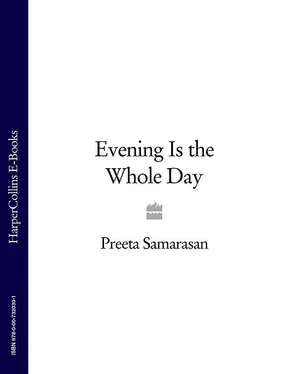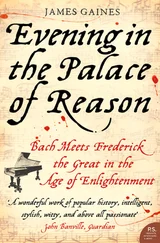The aeroplane that carried Uma away was enormous and white, with a moonkite on its tail, whereas Chellam is leaving on foot (and then by bus).
She differs from Uma in many other, equally obvious, ways. A growth spurt squandered eating boiled white rice sprinkled—on good days—with salt has left her a full head shorter than Uma; her calves are as thin as chicken wings and her skin is pockmarked from the crawling childhood diseases her late mother medicated with leafy pastes and still-warm piss furtively collected in a tin pail as it streamed from the neighbors’ cow. Severe myopia has crumpled her face into a permanent squint, and her shoulders are as narrow as the acute triangle of her world: at one corner the toddy shop from which she dragged her drunken father home nightly as a child; at another the dim, sordid alley in which she stood with other little girls, their eyelids dark with kajal, their toenails bright with Cutex, waiting to be picked up by a lorry driver or a bottle-shop man so that they could earn their two ringgit. At the third and final corner stands Ipoh, the town to which she was brought by some bustling, self-righteous Hindu Sangam society matron eager to rack up good karma by plucking her from prostitution and selling her into a slavery far less white; Ipoh, where, after two-three years (no one could say exactly) of working for friends of Uma’s parents, Chellam was handed down to the Big House. “We got her used,” Suresh had said with a smirk (dodging his Amma’s mouthslap, which had been offhand at best, since Chellam hadn’t been there to take offense).
And today they’re sending her back. Not just to the Dwivedis’, but all the way back. Uma’s Appa ordered Chellam’s Appa to collect her today; neither of them could have predicted the inconvenient drizzle. Father to father, (rich) man to (poor) man, they have agreed that Chellam will be ready at such-and-such a time to be met by her Appa and led from the Big House all the way up the unpaved, rock-and-clay length of Kingfisher Lane to the bus stop on the main road, and from there onto the bus to Gopeng, and from the Gopeng bus station down more roads and more lanes until she arrives back at square minus one, the one-room hut in the red-earth village whence she emerged just a few years ago.
A year from today, Chellam will be dead. Her father will say she committed suicide after a failed love affair. The villagers will say he beat her to death for bringing shame to her family. Chellam herself will say nothing. She will have cried so much by then that the children will have nicknamed her Filthyface for her permanent tear stains. All the women of the village won’t be able to wash those stains off her cold face, and when they cremate her, the air will smell salty from all those tears.
At twenty to ten on this September Saturday morning, she begins to drag her empty suitcase down the stairs from the storeroom where it has lived since she came a year ago. “How long ago did your Appa tell her to start packing?” Amma mutters. “Didn’t we give her a month’s notice? So much time she had, and now she’s bringing her bag down to start!”
But Chellam’s suitcase, unlike Uma’s, could never have taken a month to pack. Uma had been made to find space for all these: brand-new wool sweaters, panties with the price tags still on, blazers for formal occasions, authentic Malaysian souvenirs for yet-unmade friends, batik sarongs and coffee-table books with which to show off her culture, framed family portraits taken at Ipoh’s top studio, extra film for a latest-model camera. Chellam owns, not including what she’s wearing today, a single chiffon saree, three T-shirts (one free with Horlicks, one free with Milo; one a hand-me-down from Mr. Dwivedi, her old boss), four long-sleeved men’s shirts (all hand-me-downs from Appa), three cotton skirts with frayed hems, one going-out blouse, and one shiny polyester skirt unsuitable for housework because it sticks to her thighs when she sweats. She also has four posters that came free with copies of Movieland magazine, but has neither the strength nor the will to take them down. Where she’s going, she won’t have a place to put them. All in all, it will therefore take her three minutes flat to pack, but even her mostly empty suitcase will be a strain for her weak arms only made weaker by her lack of appetite for the past few months.
Amma will not offer Chellam tea coffee sofdrink before she goes, though she and Suresh and Aasha are just sitting down to their ten o’clock tea, and though one mug of tea sits cooling untouched on the red Formica table as Appa stands at the gate under his enormous black umbrella, speaking with Chellam’s father. There wouldn’t be time for Chellam to drink anything anyway. There’s only one afternoon bus from Gopeng to the bus stop half a mile from their village, and if she and her father miss the eleven o’clock bus to Gopeng, they’ll miss that connecting bus and have to walk all the way to their village, pulling the suitcase along behind them on its three working wheels. Chellam will probably have to do most of the pulling, and hold her father by the elbow besides, because he is drunk as usual.
Thud thud thud goes her suitcase down the stairs, its broken wheel bent under it like a sick bird’s claw. The suitcase has done nothing but sit empty in the storeroom all year, but its straps and buckles have worn themselves out and it seems now to be held shut only by several long lengths of synthetic pink raffia wound and knotted around it to keep the geckos and cockroaches out. On the uncarpeted landing the sharp edge of the broken wheel scrapes loudly against the floor. Amma flinches and shudders. “Look, look,” she whispers urgently to Suresh and Aasha without taking her eyes off Chellam. “Purposely she’s doing it. She is taking revenge on us it seems. For sending her home. As if after all she’s done we’re supposed to keep her here and feed her it seems.”
Suresh and Aasha, wide-eyed, say nothing.
In the past two weeks the many burdens they must share but never discuss have multiplied, and among them is this suddenly effusive, outward-turned Amma who whispers and nudges, who coaxes and threatens, who leans towards them with her face contorted like a villain in an old Tamil movie, desperate for a reaction. It’s as if the events of the past two weeks have dissolved the last of her reserve. This is the final victory towards which she’s been privately ascending during all those long days of dead silence and tea left to cool, though precisely what the victory is neither Suresh nor Aasha is completely sure. They’re sure only that whatever it is, it has come at too high a price.
Mildly discouraged by the children’s unresponsiveness, Amma takes a small, exacting sip of her tea. “Chhi! Too much sugar I put,” she remarks conversationally.
“For all we know,” Amma says, newly galvanized by her too-sweet tea, perhaps, or the mulishness of her children’s ears and brows, or the hesitation of Chellam and her empty suitcase on each separate stair, “she’s pregnant.”
The word, so raw they can almost smell it, contorts Amma’s mouth, offering the children an unaccustomed view of her teeth. It makes Suresh drop his eyelids and retreat into the complex patterns he’s spent his young life finding in the tabletop Formica. Men in bearskins. Trees with faces. Hook-nosed monks.
“On top of everything she has taken all that raffia from the storeroom without even asking,” Amma observes with a sigh and a long, loud slurp of her tea. Even this is out of character: Amma usually drinks her tea in small, silent sips, her lips barely parting at the rim of her mug.
For her journey home, Chellam has dressed herself in a striped men’s shirt with a stiff collar and a brown nylon skirt with a zipper in the back. The shirt is a hand-me-down from Appa. The skirt isn’t. “Look at her,” Amma says again through a mouthful of Marie biscuit, this time to no one in particular. “Just look at her. Dares to wear the shirt I gave her after all the havoc she’s caused. Vekkum illai these people. No bloody shame. Month after month I packed up and gave her your Appa’s shirts. Courthouse shirts, man, Arrow brand, nice soft cotton, all new-new. In which other house servants wear that type of quality clothes?”
Читать дальше












